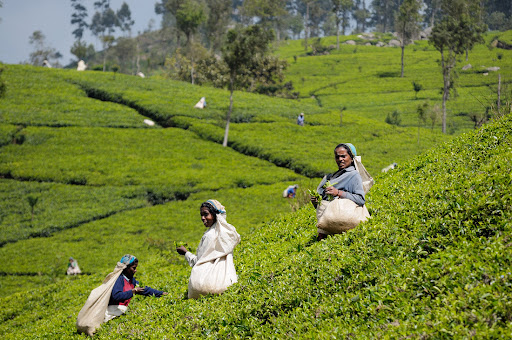Tea workers wage raised above US$ 5
The measure, announced by Commissioner General of Labour H. K. K. Jayasundara, provides for a daily wage of 1,750 rupees, up 70 per cent, to support workers crushed by the economic crisis and high interest rates. “We are unable to have three square meals a day,” lament two workers at the Hatton plantations.” Up in arms, employers claim that they cannot afford the pay rise.
Colombo (AsiaNews) – Working in tea plantations in Sri Lanka’s central highlands is one of the most precarious activities in the country, often under high pressure, unsafe conditions, unpredictable weather, and soil degradation.
On 20 April, the Commissioner General of Labour H. K. K. Jayasundara announced a 70 per cent raise in the minimum wage for this group of workers, with the pay set at 1,750 rupees (US$ 5.85) a day.
The aim is to make up for the high interest rates on loans workers need to take out to pay for their children’s school fees as well as essential foodstuffs; however, Regional Plantation Companies (RPCs) and estate employers are opposed to the increase, saying that it is excessive.
For years plantation workers have been asking the government for higher wages. Monthly salaries have been insufficient to cope with the high cost of living, a consequence of the country’s current economic crisis. For this reason, workers have to borrow at high interest rates and are unable to pay off their debts.
Despite persistent demands, it took almost 15 years for the government to implement the 1,000-rupee wage increase.
Although belated, it is an attempt to help plantation workers, who carry out their work every day, sometimes performing extra hours, picking extra kilos of tea leaves to earn extra income.
They have to harvest 22 kilos of tea leaves to earn the daily wage.
Now, due to strong winds and rains in the central highlands, the harvest has been severely hindered, and tea pickers can only work for four or five months.
Published in the Gazette No. 2382/04, the announcement by Commissioner of Labour’s decision says that companies will have to pay 1,350 rupees as a daily wage, 350 rupees as a special daily allowance, and 80 rupees for each additional kilo harvested.
In a statement, the Planters Association of Ceylon, the country's largest industry organisation, noted that in its Gazette's notification, the government sought to determine the minimum wage to respect workers engaged in tea production, but also indicated 15 May as the deadline for objections, which the Association decided to submit.
For T. M. Sandaruwan, of the up-country Tea Smallholders Association, there are obstacles to the implementation of the new measure.
“We were adversely affected by the shortsighted inorganic fertiliser policy haphazardly implemented during the previous regime and the cost of production exceeded our profits,” he said.
“The average cost is 230 rupees per kilo. The cost of fertiliser, wages, and other expenses, including administrative charges, sum up to approximately 280-300 rupees per day. This is more than the amount we generate. So, how can we increase wages? It is impossible.”
On the other hand, Lechchamee Murugesu, 42, and Dhanalakshmi Kandasamy, 45, female workers on the Hatton plantations, spoke to AsiaNews about their situation.
“In most families, women are the sole bread winners,” they said. In addition, they take care of their children and elderly parents who live in the same household.
“As our husbands are contract labourers and have lost jobs due to the economic crisis and because of high cost of living, paid wages are not enough.” In fact, a thousand rupees a day is not enough to cover a month's needs.
“Everybody depends on our earnings and we are unable to have three square meals a day,” they lamented. “At times, when our parents are sick, we have to take them in a trishaw to town to seek medical treatment, which costs at least 3,000 rupees for a single trip.”
22/04/2024 14:32
22/03/2022 12:15







.png)










